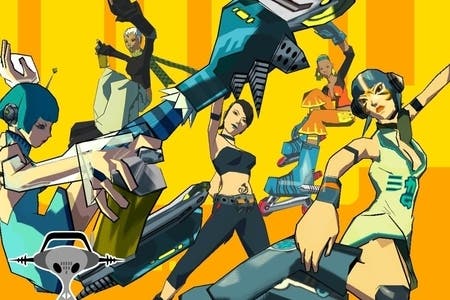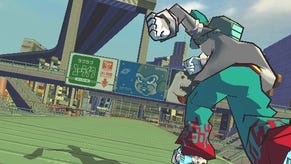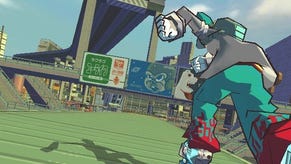Retrospective: Jet Set Radio Future
From the archive: looking back at a series that helped inspire this week's big release, Sunset Overdrive.
Given Sunset Overdrive's obvious debt to Jet Set Radio and its role as a key Xbox One exclusive, where better to go for this weekend's archive piece? This retrospective was originally published in September 2012.
One morning a few days back, somewhere near the Shibuya bus terminal, Combo asked me to copy his moves. Up a ramp, over a lamppost, along a few rippling curves of fencing and then out across the street. Turn and bow. Simple things. There was a problem, though: I was rusty, and I'd lost my skating skills.
Actually, it's so much more embarrassing than that. In reality, I was rusty and sitting on the other side of a TV screen, and I'd lost my pretend skating skills.
Eight years ago I was something to see on the pretend skating circuit, I reckon. I tagged every inch of this pretend bus terminal, and every inch of the pretend city beyond it. These days? Nothing. Zero. Look at me and weep! Wasting paint, falling off ledges, hit by a dozen passing cars: Combo isn't programmed to show pity, but I sensed it all the same.
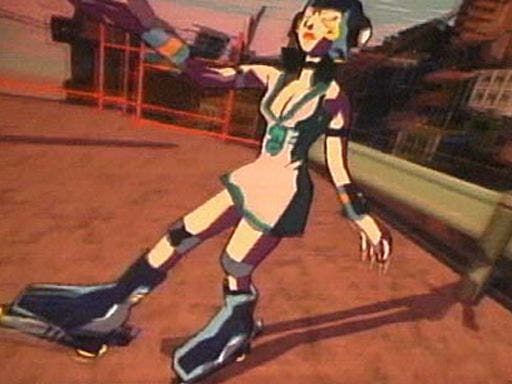
It hurts, this failure of poise, of cool, and that's because Jet Set Radio Future is a very cool game. Its soundtrack is cool. Its lineage is cool. Heck, its collectable Graffiti Souls are cool, as is that little blurb that pops up when the game's initially loading - the one that tells you that graffiti is art, but that some graffiti is vandalism and SEGA simply isn't down with that.
None of this would be in any way noteworthy, except there still aren't actually that many cool video games, and there were even fewer back in 2002, when this tale of in-line skaters, taking back their city by tagging every inch of it, hit the original Xbox. Jet Set Radio Future is cool because the people who made it were probably cool. They didn't have to focus group it. They didn't have to bring people in. They didn't have to reach to capture what effortless style is all about.
Oh, yeah: and it normally makes you feel cool when you're playing it, too. Get into the rhythm with Jet Set Radio Future, in fact, and it can be like nothing else around. You're not really doing that much most of the time - just grinding along and tapping face buttons to pull off tricks - but the animations are world beaters, so stylised and yet so human, and even the shortest of the audio cues pretty much punches you in the nuts with a sonic fist of happiness.
Level transitions bristle with bursts of radio static, completed graffiti tags are accompanied by a taut little synthesiser buzz, and the mix tape music that pulses and tumbles and jitters out of your TV is an absolute marvel. I still listen to the game's soundtrack, and it still surprises me. Then there are the sparks, the blurs, the little clouds of smoke and dust: few games go to this kind of effort to make the player feel so good about things. Three of the greatest dancers I ever came across are characters in Jet Set Radio Future. I think that speaks volumes. Sadly.
Jet Set Radio Future is far less technical than its older sibling on the Dreamcast - unlike the original game, you don't have a time limit for each level, and you don't have to perform specific movements to lay down graffiti tags. For my personal tastes, it's actually better off without any of that stuff. The absence of a ticking clock means you can enjoy just getting around. You can enjoy just not getting around, too. You can wallow like a fat tourist, you can linger to check out the cyber-hipster pedestrians crossing at the lights or sat outside coffee shops, and you can explore the game's sticker-bombed levels at your own waddling pace. The trigger-squeeze graffiti, meanwhile, allows you to skate along messing up walls without ever having to think, or take a stray breath. Who really enjoys breathing, anyway? Who really enjoys thinking?
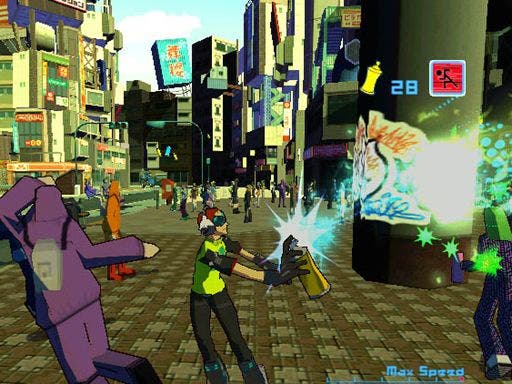
And, unlike the first game, everything fancy in Jet Set Radio Future is rather easy to do: that means you won't earn those sudden flashes of brilliance, perhaps, but you can still own them, and it also means that the chances of pulling off something astonishing are relatively high, as are the chances that you'll be able to chain your best moments together.
This is where Jet Set Radio Future goes from being a good game to a really great one, if you ask me. Its cluttered streets are a riot of visual noise when you first start moving through them - this Tokyo, despite its relative lack of interactive elements, is one of the most convincingly lived-in spaces a game has ever offered up, from the teetering boxes of trash lining its back alleys to the thoughtful dandy perched on the edge of a railing who dashes away when you approach. Beneath all that, the fun lies with finding the racing line the developers have laid through the environment. The route that zips up flagpoles and over telephone wires, that leads along the entwined tails of 99th Street's neon dragons, or from railing to billboard to railing to billboard as you blast across Chuo Street knocking people's hats off.
Play Jet Set Radio Future correctly, and every time you touch the actual ground it feels like something of a failure. The game means to keep you moving, and it even creates a kind of texture of quiet obstruction if you're going against the grain. There's little as annoying - or instructive - as being snagged on one of its corners, for example, or being forced to hop, slowly, humanly, up its stairs instead of zipping, crouched and cackling, along the bannister.
The maps are dense, and they're filled with secret spaces and clever shortcuts. Compared to the linear channel of most games, Jet Set Radio Future's loop-like environments are intoxicating: you're in the middle, and the game surrounds you. Even more than its Dreamcast forerunner, it truly embraced design in three dimensions, and I have no idea how the level team got started, let alone how they finished it off so effortlessly.
The big picture is wonderful, and the detailing is just as good. That soundtrack's a case in point, with its influences scattered in every direction but tied together by a cheery, breezy outlook. It has the scattershot feel of a real record collection, built up over years by flipping through boxes in out-of-the-way stores where everyone knows the manager.
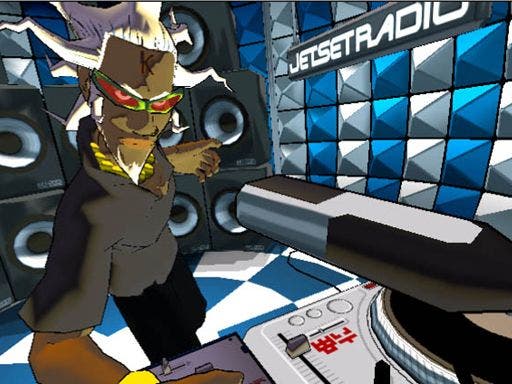
The characters are stellar, too, even if they don't have much actual character to them in the traditional video game sense. Who cares about that? You don't need a cut-scene or a dialogue tree to tell you that Gum's the girl that never seems to really see you, or that the Poison Jam crew are fuelled, in part, by a kernel of self-disgust that they have somehow managed to reclaim and make their own. Hayashi, the cop who's forever on your tail, looks like a demented George Washington, and he has the persecution complex that often goes with someone who believes, emphatically, that they're marked out for great things, while the villainous Rokkaku Group has a logo that looks a little like the GameCube's. We all know what that's about.
This last part suggests old conflicts, but the game actually feels rather timely, as the police send in the tanks and the spotlights and the men with guns to quell this sweet-natured urban insurrection. The years that have passed since Jet Set Radio Future's release have been years of overkill, perhaps, and years of steadily rising over-reaction. The urge to Occupy Tokyo is stronger now than ever.
But the true test of the game - for me, at least - came when I visited the real Tokyo a few years ago. I was there to see Q Entertainment for a magazine article, and I'm guessing I'd never travelled so far from home. The funny thing though is that everywhere I looked I felt like I was at home anyway. Because of Jet Set Radio Future, I recognised almost all of the streets around Shibuya - those strange, fiercely clean alleyways sloping away at odd angles, filled with boutiques and arcades and neat little coffee places. I knew the lay of the land at Harajuku, too: the short flight of steps down, and then the bright lights and colourful storefronts pootling off into a busy vanishing point.
And finally, the morning I left, I glimpsed the Shibuya bus terminal through my hotel window: the overhead walkways, the tidy rows of shelters, the gently curving barriers. I'd been there before! I'd covered that whole neighbourhood with graffiti and used those light green buttresses to show Combo a thing or two about pretend skating. Back when I was cool, remember? Back when I could slide across the entire city in a single breath, crates flying, cars honking, birds erupting from the rooftops. Back when I could leap into the night sky on a whim, bouncing from one giant satellite dish to the next, red lights winking on the horizon.
Red lights and clean edges. A million miles passing, in one soft second.
